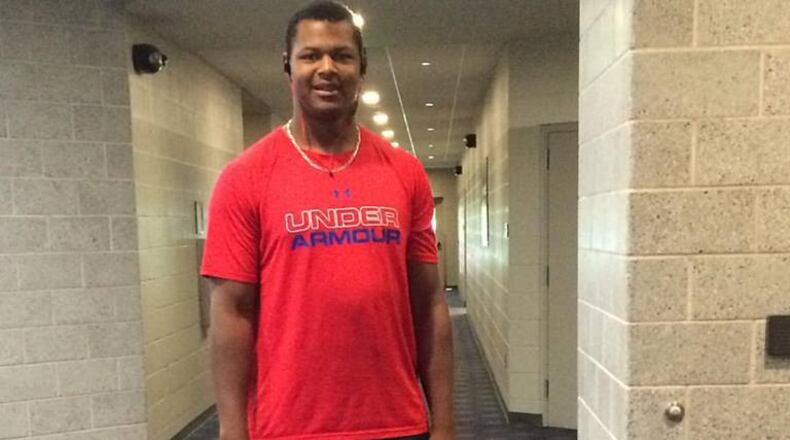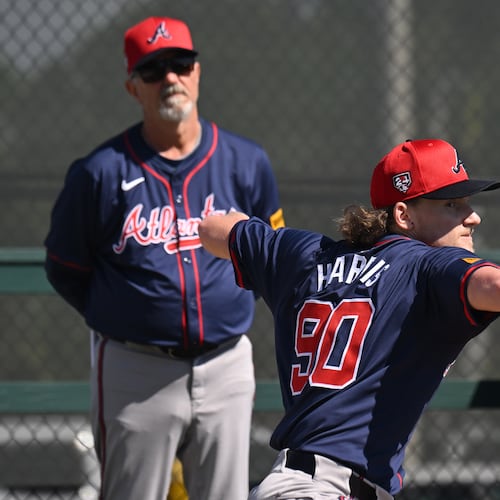PHOENIX – Scouts have clocked Mauricio Cabrera's fastball in triple digits on a regular basis here in the Arizona Fall League, but after his first three appearances his ERA was still in double digits, as in 12.27.
Hence the quandary of Cabrera, who can throw 102 miles per hour but still has plenty of work to do if he’s to become a major league pitcher.
Actually, quandary might be a bit of an overstatement, since he only turned 22 in September and the Braves aren’t facing any immediate deadlines or decisions about his future.
For now, they will wait and hope that it clicks for Cabrera, that he improves his location and hones his curveball to complement that impressive heater and a 92-93 mph changeup that's also a plus pitch. He needs the curveball to give him something a little softer to keep hitters off-balance.
He’s pitched in five minor league seasons and made only 13 appearances above Class-A, all of those 13 coming in relief this past season at Double-A Mississippi.
In Arizona, much as during the minor league season, Cabrera has shown flashes of dominance as well as episodes of how-can-he-struggle-like-that?
The 6-foot-3, 230-pound Dominican gave up six hits and five earned runs in 2 2/3 innings over his first two appearances for the Peoria Javelinas, who have six other Braves minor leaguers on their roster, some of them here to get more at-bats or innings after missing time following a harrowing bus crash that sidelined several members of the high-A Carolina team.
But after getting knocked around in his first two AFL outings, Cabrera allowed two hits and one walk with four strikeouts in two scoreless innings over his next two appearances Oct. 24 and Wednesday (Oct. 28). I’m out here to see Peoria play three games and looking forward to seeing him pitch at least once and maybe twice (he didn’t get in Friday’s game, but is likely to pitch Saturday).
Dan Winkler, by the way, pitched one perfect inning in Friday’s 4-1 win against Glendale. Winkler, a Rule 5 pick last December, made his major league debut for the Braves late this season after recovering from Tommy John surgery. The righty has made four AFL relief appearances (through Friday) and given up four hits, two runs and two walks with five strikeouts in four innings.
Winkler, 25, doesn’t throw anywhere near as hard as Cabrera – he’s about double-digits below him in peak velocity -- yet Winkler had a 3.35 ERA and 447 strikeouts in 429 2/3 innings in four minor league seasons in the Rockies organization, including a 1.41 ERA in 12 starts at Double-A Tulsa in 2014, with 71 strikeouts and only 17 walks in 70 innings.
Cabrera has a 4.35 career ERA in 113 games (50 starts). He has 275 strikeouts and 174 walks in 322 2/3 innings.
Signed for $400,000 in 2010, Cabrera pitched in the Dominican summer league in 2011, then led the Appalachian League with a .213 opponents’ average for rookie-league Danville in 2012 in his first season in the United States.
He was the No. 10 prospect in the South Atlantic League for low-A Rome in 2012, but a forearm strain forced him to miss two months of the 2013 season in high-A. Cabrera returned to high-A Carolina to begin the 2015 season and ended up with an ERA well over 6.00 for the second season in a row – he had combined 6.33 ERA in 36 appearances in '15 at high-A and Double-A with 53 strikeouts and 35 walks in 48 1/3 innings.
Winkler is three years older and in what should be his prime, but it’s still rather startling to note how much more success he's had with so much less, in terms of sheer stuff. Not that this is unique. The Braves have had other pitchers who threw 100 mph in the minors and never amounted to much, and they’ve had some highly successful pitchers who never threw much harder than the low-90 mph range.
Not to oversimplify, but Winkler was so successful in Double-A last season because he has a couple of things that Cabrera does not: Deception and good location. Location doesn’t really need explanation, and is something that Cabrera can still improve. But deception is more difficult. Winkler has a little hitch in his delivery, a funky motion that makes it hard for hitters to pick up his pitches.
Cabrera doesn’t have deception, and perhaps you've heard what they say about big-league hitters being able to time a jet (an exaggeration to illustrate that good major league hitters can hit four-seam fastballs, no matter how hard they're thrown). Even good minor league hitters can hit upper-90s (or above) fastballs if they’re straight and not complemented by a good secondary pitch. Cabrera's curve still isn’t consistent, his plus-changeup is thrown at a much higher velocity than most pitchers, and hitters, particularly lefties, see his fastball well.
Hitters can “sit” on the fastball, and when Cabrera doesn’t have good location they can also go to the plate knowing there’s a pretty good chance they can work a walk.
So he’s a work in progress. The potential is huge, and the Braves put him on the 40-man roster last winter, so they have expectations. But it’s also not like he’s only 19 or 20 years old. It’s not a given that he’ll ever realize the enormous potential in that arm.
When he pitches like he has his past couple of times he's been on the mound in Arizona, against some pretty good young hitters, the Braves can’t help but maintain their high hopes for the flame-throwing prospect.
• Mike Minor continues to gradually increase his throwing program after the left-hander missed the 2015 season with a shoulder injury that required surgery. He's expected to throw off a mound by mid- to late-November, and the Braves have a Dec. 2 deadline to offer him a contract (the tender deadline, when teams must offer contracts to all unsigned players on their 40-man rosters, else they become non-tendered free agents).
Minor is again eligible for arbitration. Through the arbitration process he could be offered no less than 80 percent of his 2015 salary, which was $5.6 million (after he won his spring arbitration hearing against the Braves, who had offered $5.1 million). The Braves have indicated they plan to, or at least want to, re-sign him and have him in the rotation. They reason that with the price of pitching these days, it’s worth the $5 million-or-so gamble that he’ll be healthy in 2016 with a repaired shoulder, after being slowed or sidelined for most of two seasons with shoulder issues.
• The Braves signed three pitchers to minor league contracts including veteran Chris Volstad and interesting independent-league prospect Connor Little, who is not little (6 feet 6, which is actually two inches shorter than Volstad).
• Let's close with this great song from Chris Stapleton, who is the real deal. He and his wife sing this live version of one of the many great cuts from his outstanding album, Traveller.
"FIRE AWAY" by Chris Stapleton
Honey load up your questions
And pick up your sticks and your stones
And pretend I’m a shelter for heartaches that don’t have a home
Choose the words that cut like a razor
And all that I’ll say is
Fire away
Take your best shot
Show me what you got
Honey, I’m not afraid
Rear back and take aim
And fire away
Well, I wish I could say
That I’ve never been here before
But you know and I know
That I’ll always come back for more
Your love might be my damnation
But I’ll cry to my grave
Fire away
Take your best shot
Show me what you got
Honey, I’m not afraid
Rear back and take aim
And fire away
About the Author
Keep Reading
The Latest
Featured





